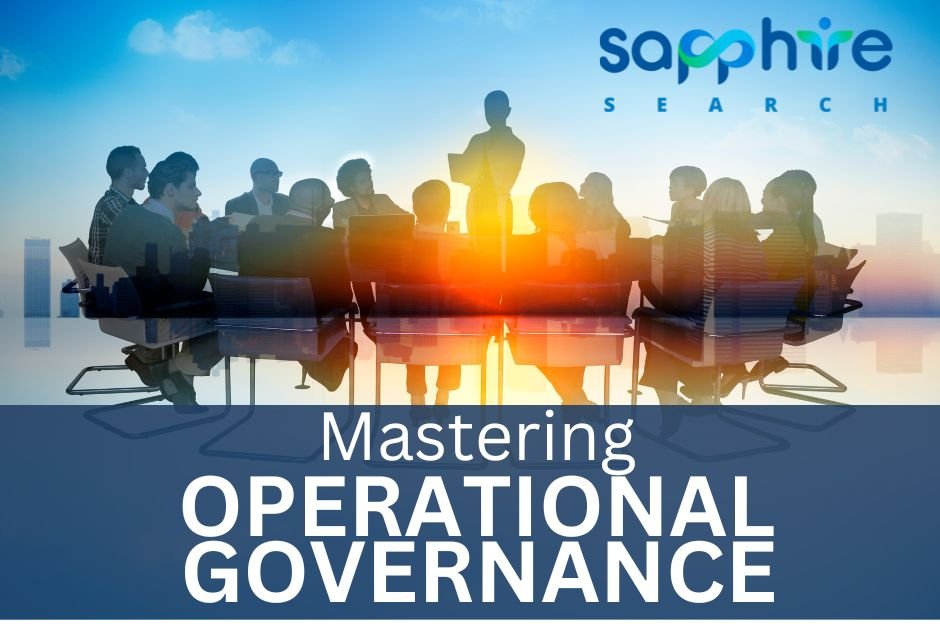
As the global economy experiences fluctuations, it is crucial for business leaders to leverage operational governance as a strategic tool to adapt, enhance resilience, drive agility, and optimize resource utilization.
During times of economic uncertainty or downturn, CEOs must be agile and proactive in their approach to operational governance. Leaders can quickly adapt their organizations to changing market conditions by leveraging robust governance frameworks. This may involve adjusting resource allocation, optimizing costs, or pivoting business strategies to maintain competitiveness and ensure long-term sustainability.A well-structured operational governance system enables CEOs to make data-driven decisions, respond rapidly to market changes, and implement necessary adjustments to their operations. Organizations can navigate turbulent economic environments with greater confidence and resilience by fostering continuous improvement and adaptability.One example of a company that successfully adapted to economic fluctuations is Lego. During the 2000s, the company faced declining sales and financial difficulties due to overexpansion and a lack of focus on its core product lines. However, under the leadership of CEO Jørgen Vig Knudstorp, Lego implemented a comprehensive operational governance framework that streamlined processes, reduced costs, and refocused the company on its iconic building blocks. By leveraging operational governance to adapt to changing market conditions, Lego was able to turn around its fortunes and become one of the most successful toy companies in the world.
Robust operational governance frameworks are essential for building organizational resilience in the face of economic shocks or disruptions. By having clear processes, controls, and decision-making structures in place, CEOs can better navigate turbulent economic environments and minimize the impact on their operations.A resilient organization is one that can withstand external pressures, adapt quickly to changing circumstances, and emerge stronger from challenging situations. Effective operational governance enables leaders to anticipate potential risks, implement mitigation strategies, and ensure business continuity even in the face of economic volatility.Despite facing intense competition from e-commerce giants like Amazon, Walmart has remained a dominant force in the retail industry by leveraging its operational governance framework to optimize supply chain management, streamline inventory control, and enhance customer experience. By continuously adapting its operational processes to changing market conditions, Walmart has maintained its profitability and market share even during periods of economic uncertainty.
In a volatile economic landscape, operational agility is a critical success factor for organisations. Effective operational governance enables CEOs to make data-driven decisions, respond rapidly to market changes, and implement necessary adjustments to their operations.Agile organisations are characterised by their ability to pivot quickly, experiment with new approaches, and learn from their experiences. By fostering a culture of innovation and continuous improvement, CEOs can empower their teams to identify and seize new opportunities in rapidly changing market conditions.As the entertainment industry has undergone significant disruption due to technological advancements and changing consumer preferences, Netflix has consistently adapted its operational processes to stay ahead of the curve. By leveraging data analytics to optimise content creation and distribution, and by continuously refining its operational governance framework, Netflix has been able to rapidly respond to market changes and maintain its position.
During periods of economic constraint, CEOs must prioritise the efficient and effective utilization of the organization's resources, such as capital, talent, and technology. Operational governance plays a crucial role in ensuring that resources are allocated strategically and aligned with the organization's priorities.By leveraging data analytics, automation, and process optimisation, CEOs can identify areas for improvement, eliminate waste, and streamline operations. This not only helps to reduce costs but also enables organizations to maintain profitability and competitiveness even in challenging economic conditions.Despite intense competition in the technology industry, Apple has maintained its position as a market leader by leveraging its operational governance framework to streamline product development, optimize supply chain management, and enhance customer experience. By continuously refining its operational processes and aligning resource allocation with strategic goals, Apple has been able to maintain profitability and market share even during periods of economic uncertainty.
To effectively leverage operational governance in navigating economic fluctuations, CEOs should consider the following strategies:
By effectively leveraging operational governance, CEOs can drive organizational success, enhance resilience, and optimize resource utilization, even in challenging economic environments. By embracing a culture of adaptability, innovation, and continuous improvement, organizations can navigate the complexities of today's business world with confidence and agility.
With Sapphire, discover visionary leaders who elevate your organization to its fullest potential.
Contact us today to schedule a consultation with one of our expert consultants. We'll help you identify opportunities for growth and improvement.
Whether you’re looking for top leadership, market insights, or updates on exclusive events, share your query with us.
We are India’s most agile executive search and leadership advisory firm, with over 1,500 leadership closures across industries. We’ve placed more than 50 CEOs and 40+ Partners in top consulting firms, establishing a proven record of impact.
From building entire leadership teams for financial services houses to closing rare mandates like Chief Data Scientist for a US tech firm’s India R&D centre, we have deep expertise in BFSI, Technology & Consulting, Industrials, Infrastructure, Healthcare, Consumer, and Retail.
We executed India’s largest team movement by a search firm (65+ leaders in one transaction) and facilitated the highest-value leadership hiring deal in India.
Our Founder & CEO, Ankit Bansal, is a serial HR entrepreneur with prior experience at McKinsey, PwC, and Standard Chartered. He also co-founded one of India’s largest flexi-job platforms and is an Advisory Board member of the India Diversity Forum.
Schedule a free 30-minute discovery call with one of our consultants to discuss your specific needs and how we can help transform your business.
Book a Discovery Call
Whether you’re looking for top leadership, market insights, or updates on exclusive events, share your query with us.